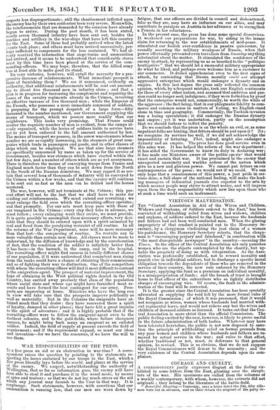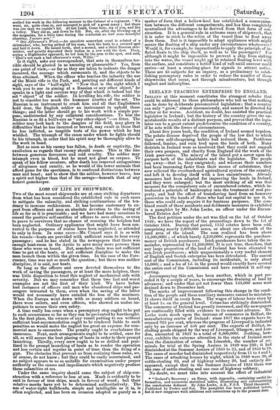COURAGE AND CRUELTY.
A CORRESPONDENT justly expresses disgust at the feeling ex- hibited in some letters from the East, gloating over the slaugh- ters of the war. His specimens are culled from the columns of a weekly contemporary, with whom, however, the extracts did not originate ; they belong to the literature of the battle-field. " Beautiful Shooting.—Yesterday, says a letter dated the 23d, fifty rifle- men were out in advance, and on their return the sergeant of the party de-
scribed his work in the following manner to the Colonel of a regiment. We went, sir, quite close in, and managed to pick off a great many ; but there was one man we couldn't hit. At last laud, Come here, six of you, and fire a volley. They did so, and down he fell. But, sir, after the blowing-up of the magazine, for a little time during the confusion we had some beautiful shooting, I assure you.' " " One Afternoon's Work.—An anecdote somewhat cruel is related of a skirmisher, who, having picked off his man, took the body to a covered spot and laid it down. He issued forth, shot a second, and a third Russian skir- misher, and quietly deposited their bodies in a row with the first. Then, seeing a Highlander approach, be led him by the arm to the spot, and said, That's not such a bad afternoon's work, Willie.' "
Is it right, asks our correspondent, that ants in themselves ter-
rible should be gloried in as amusing or pleasurable ? Yes, from one point of view,—so far as they are taken to indicate the danger incurred, the courage which surmounts it, and the objects to be thus attained. When the officer who teaches the infantry the use of the Minie rifle in the Park, and, pointing out different kinds of sight, says of the "half-sight," "Now that is the sight which I wish you to use in aiming at a Russian or any other object," he speaks in a light and careless way of that which is indeed but the set " object" of the soldier. In levelling his rifle, the soldier is not to consider too much the humaner niceties of the act. The Russian is an instrument to crush him and all that Englishmen hold dear, the English soldier an instrument to uphold those things; and the latter should go to his work with a simple pur- pose, undistraoted by any collateral considerations. To him the Russian is as fit a bull's-eye as "any other object "—or fitter. The soldier may look back to the dangers of the field, may glory in difficulties that he has incurred or braved, may exult in those that he has inflicted, as tangible tests of the power which he has wielded. The triumph of the cause under which he fights should be his triumph, in order that his spirit may be thoroughly alive to the work in hand.
But as soon as his enemy has fallen, in death or captivity, the exultation as regards that enemy should cease. This is the line between generous fierceness and cold cruelty. The soldier may triumph even in blood, but he must not gloat on corpses. To speak of his fellow creature, after death has removed antagonisms of allegiance and enmity, as he would of the lower animals that afford game for the sportsmen, is to confound distinctions between man and beast; and to show that the soldier, however brave, has a spirit not higher than that of the savage—beneath that of any honest gamekeeper.



































 Previous page
Previous page